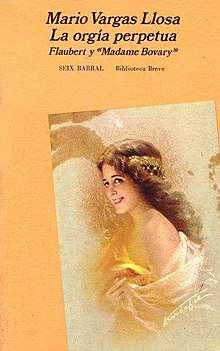The Perpetual Orgy

First edition (publ. Seix Barral)
The Perpetual Orgy: Flaubert and Madame Bovary (Spanish: La orgía perpetua. Flaubert y Madame Bovary, 1975) is a book-length essay by the Nobel Prize–winning Peruvian novelist Mario Vargas Llosa which examines Flaubert's Madame Bovary as the first modern novel. The first part of the book has an autobiographical tone; Vargas Llosa then goes on to examine the structure and meaning of Madame Bovary as well as its role in the development of the modern novel. First published in Spanish in 1975, the book was translated into English in 1986 by Helen Lane.[1]
According to Julian Barnes:[2]
Most of The Perpetual Orgy, at last available in Helen Lane's elegant translation, is a discussion of the genesis, execution, structure and technique of Madame Bovary. It is the best single account of the novel I know. Flaubertistes will instantly set it alongside Francis Steegmuller's classic Flaubert and Madame Bovary; students of literature who want to know how a novel works could not be better advised than to listen to Mr. Vargas Llosa hunched over this masterpiece like some vintage car freak over the engine of a Lagonda.
John Gross, also reviewing the Helen Lane translation for The New York Times, praised the book's treatment of Flaubert's technical mastery:[1]
He [Vargas Llosa] is excellent, however, on more fundamental matters, on the handling of time in the novel (he differentiates four types of Flaubertian time—singular, circular, immobile and imaginary) and on the constantly shifting narrative viewpoint. These may sound like dry technical issues, but Mr. Vargas Llosa brings them to life, and makes it clear how central they are if you want to understand the suppleness and subtlety that Flaubert achieved.
References
- 1 2 John Gross (1986-12-09). "Books of the Times". The New York Times. Retrieved 2011-01-24.
Originally published in Spanish in 1975, this has now been translated into English under a title taken from one of Flaubert's letters, in which he wrote that the only way to make existence bearable was to lose oneself in literature as in a perpetual orgy.
- ↑ Julian Barnes (1986-12-21). "Once in Love with Emma". The New York Times. Retrieved 2011-01-24.
It is important to take Vargas Llosa's opening declaration of love seriously, not as a mere critical conceit, a smart way into the book for him.
This article is issued from
Wikipedia.
The text is licensed under Creative Commons - Attribution - Sharealike.
Additional terms may apply for the media files.